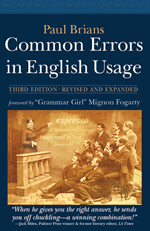astrology / astronomy
yanira.vargasModern astronomers consider astrology an outdated superstition. You’ll embarrass yourself if you use the term “astrology” to label the scientific study of the cosmos. In writing about history, however, you may have occasion to note that ancient astrologers, whose main goal was to peer into the future, incidentally did some sound astronomy as they studied the positions and movements of celestial objects.
BUY THE BOOK!
